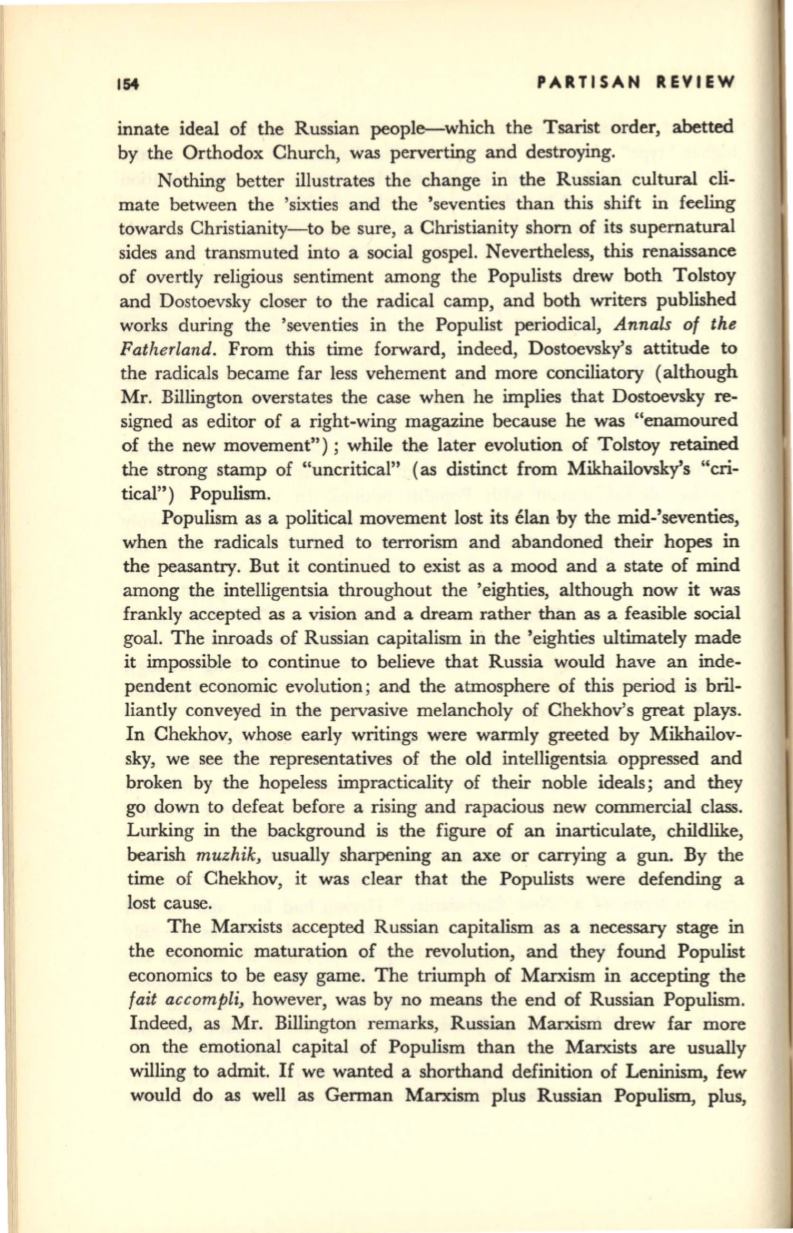
154
PARTISAN REVIEW
innate ideal of the Russian people-which the Tsarist order, abetted
by the Orthodox Church, was perverting and destroying.
Nothing better illustrates the change in the Russian cultural cli–
mate between the 'sixties and the 'seventies than this shift in feeling
towards Christianity-to be sure, a Christianity shorn of its supernatural
sides and transmuted into a social gospel. Nevertheless, this renaissance
of overtly religious sentiment among the Populists drew both Tolstoy
and Dostoevsky closer to the radical camp, and both writers published
works during the 'seventies in the Populist periodical,
Annals of the
Fatherland.
From this time forward, indeed, Dostoevsky's attitude to
the radicals became far less vehement and more conciliatory (although
Mr. Billington overstates the case when he implies that Dostoevsky re–
signed as editor of a right-wing magazine because he was "enamoured
of the new movement") ; while the later evolution of Tolstoy retained
the strong stamp of "uncritical" (as distinct from Mikhailovsky's "cri–
tical") Populism.
Populism as a political movement lost its elan by the mid-'seventies,
when the radicals turned to terrorism and abandoned their hopes in
the peasantry. But it continued to exist as a mood and a state of mind
among the intelligentsia throughout the 'eighties, although now it was
frankly accepted as a vision and a dream rather than as a feasible social
goal. The inroads of Russian capitalism in the 'eighties ultimately made
it impossible to continue to believe that Russia would have an inde–
pendent economic evolution; and the atmosphere of this period is bril–
liantly conveyed in the pervasive melancholy of Chekhov's great plays.
In Chekhov, whose early writings were warmly greeted by Mikhailov–
sky, we see the representatives of the old intelligentsia oppressed and
broken by the hopeless impracticality of their noble ideals; and they
go down to defeat before a rising and rapacious new commercial class.
Lurking in the background is the figure of an inarticulate, childlike,
bearish
muzhik,
usually sharpening an axe or carrying a gun. By the
time of Chekhov, it was clear that the Populists were defending a
lost cause.
The Marxists accepted Russian capitalism as a necessary stage in
the economic maturation of the revolution, and they found Populist
economics to be easy game. The triumph of Marxism in accepting the
fait accompli,
however, was by no means the end of Russian Populism.
Indeed, as Mr. Billington remarks, Russian Marxism drew far more
on the emotional capital of Populism than the Marxists are usually
willing to admit.
If
we wanted a shorthand definition of Leninism, few
would do as well as German Marxism plus Russian Populism, plus,


